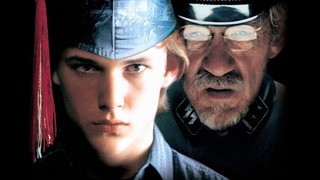'Apt Pupil's Ending Is A Lot Weirder In Light Of, You Know, Things

Remember the 1998 Sir Ian McKellan vehicle Apt Pupil? No? That's normal. Here's a recap: A teenage boy named Todd who could charitably be described as a history buff discovers that his neighbor is a former Nazi living under an assumed identity to escape justice and blackmails him into reliving the atrocities he committed. You know, for educational purposes.
This drives everyone a bit nuts, and unbeknownst to each other, they both start murdering homeless people. While burying one of his victims, the Nazi has a heart attack, and his identity is discovered when he ends up sharing a hospital room with a Holocaust survivor. The Nazi had previously posed as the Todd's grandfather in a meeting with his guidance counselor, so when the guidance counselor confronts the boy about the deception, Todd kills him and then goes on a much less careful shooting spree that ends with his death at the hands of police. It's a heartwarming film.
Don't Miss
Wait, no, that's not the film at all. That's Stephen King's 1982 novella on which the film is based. The screen version omitted much of the violence, restricting it to the single victim the Nazi is burying when he has a heart attack, and ends with Todd merely threatening to tell everyone that the guidance counselor came onto him.
It could be reasonably assumed that the original story was just too violent for the screen, but at this point, we should tell you the movie was directed by and written with heavy involvement from Bryan Singer. Now we're not mind reader, and weren't part of the production, but we're left to wonder: Why would Singer choose that specific ending? What a baffling mystery.
Unrelated, but as long as we're talking about Apt Pupil, did you know it was the subject of some of the first allegations of sexual abuse against the director? Three underage boys who appeared in a shower scene filed a lawsuit two weeks after the scene was filmed claiming that Singer forced them to strip naked for it. We hate to ruin such an otherwise lighthearted film like this, but you're surely comforted by the fact that you probably had no plans to watch it anyway.
Top Image: Sony Pictures